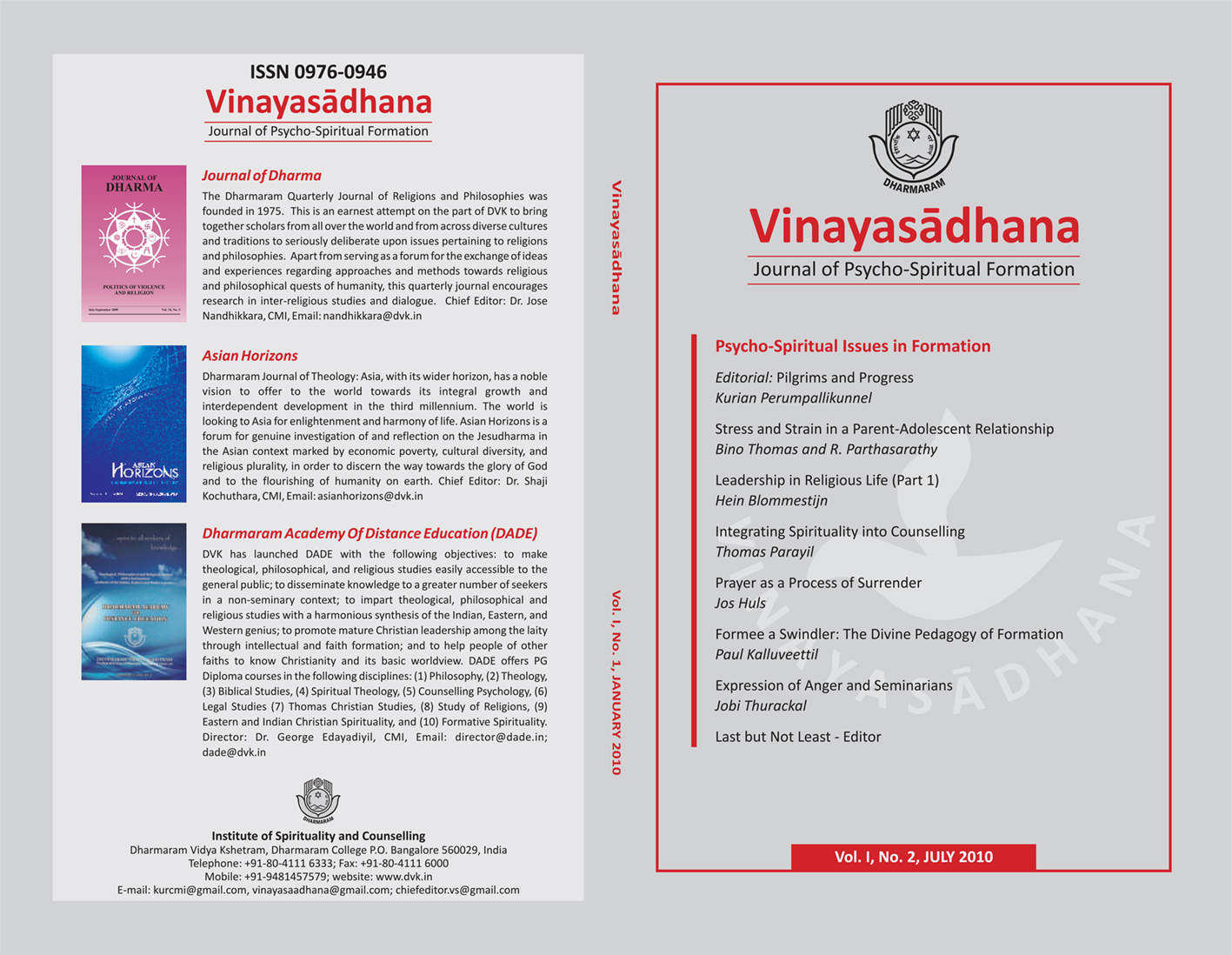Stress and Strain in a Parent-Adolescent Relationship
Keywords:
Stress and Strain, Parent-Adolescent Relationship, parenting skillsAbstract
As part of developing a parenting skills training programme in view of strengthening the parent-adolescent relationship, 60 couples were selected on a random basis from a Bangalore city based school during one of their Parent-Teacher Association meetings. The 60 couples were interviewed separately, 5 hypothetical situations which were reported by parents as the difficult situations to manage adolescents were given to them for their report on managing in their own ways. The results showed that about 31% to 42% of parents used unhealthy ways of handling such situations and mothers were found to be significantly using healthier ways of managing such situations than fathers.
References
Abraham, L. (2003). True-love, time-pass, bhai-behen: Heterosexual relationships among the youth in a Metropolis. In: UNFPA. Adolescents in India; a profile. New York: UNFPA
Baumrind, D.(1968). Authoritarian vs. authoritative parental control. Adolescence. 3:255-71.
Bector, S. & Katyal, S. (1998). Attentive parents have considerate kids. Social welfare, 45(7).
Bersamin, & others (2008). Parenting Practices and Adolescents Sexual Behavior: A Longitudinal Study. Journal of Marriage and Family. 70:97-112.
Bhende, A.A. (1994). A study of sexuality of adolescent girls and boys in underprivileged groups in Bombay. Indian Journal of Social Work. 4:557- 71
Carter, N. (2004). See how we grow: a report on the status of parenting education in the US. In: Hoghugi, M., and Long,N. Handbook of parenting; theory and research or practice. London: Sage publications
Collins, W.A., & others (2002). Contemporary research on parenting. American Psychologist. 55(2):218-32.
Davitz, L.L. & Davits, J.R. (2003). Parenting teenagers; 20 tough questions and answers. New Jersy: Paulist Press
Dollahite, D. (2004). Fathering, faith and spirituality. In: Hoghughi, M. & Long, N. Handbook of parenting, theory and research for practice. New Delhi: Sage Publications.
Dumn, J. & Plomin, R. (2000). Determinants of maternal behavior toward three year old siblings. In: Collins, W.A. & others. Contemporary research on parenting. American Psychologist, 55(2):218-32.
Hardyment, C.(1995). Perfect parents: baby care advise, past and present. Oxford: Oxford Univerisity press
Herbert, M. (2004). Emotional problems of development. In: Hoghughi, M., & Long, N. Handbook of parenting, theory and research for practice. New Delhi: Sage Publications
Hoghugi, M. & Long, N. (2004). Handbook of parenting; theory and research or practice. London: Sage publications.
Huxley, R. (2008). Six Steps to Stress-Free Parenting (well, almost!). [Retrieved on 2008 Sept 29]; Available from: URL: http://www.thehappyguy.com/articles/stress-freeparenting.html
Khosla, R. (2003). Youth in urban slums. In: UNFPA. Adolescents in India; a profile. New York: UNFPA
Kiselica, M.S. & others (1994). Preparing teenage fathers for parenthood: a group psychoeducational approach. Journal for Specialists in Group Work, 19:83-94
Knoester, C. & Eggebeen, D.J. (2006). The effects of the transition to parenthood and subsequent children on men’s well being and social participation. Journal of Family Issues, 27.
Knoester, C. & others (2006). Parenting practices and Adolescents’ Friendship Networks. Journal of Marriage and Family, 68:1247-60
Krishnan, L. (2002). Child Rearing: The Indian Perspective In: Kapur, M., & Mukundan, H. Child Care in ancient India from the Perspectives of Developmental Psychology and Paediatrics. New Delhi:Sri Satguru Publications
Kuczynski, L. (2002). Handbook of Dynamics in Parent Child Relations. New Delhi: Sage Publications
Larsen, R. & Richards, M.H. (1991). Daily companionship in late childhood and early adolescence: Changing developmental contexts. Child Development, 62:284-300
Moffat, G. (2004). The parenting journey; from conception through the Teen years. London. Praeger Publishers
OSDW (2008). Parenting Skills Primer. [retrieved on 2008 Sept 29]; Available from: URL http://www.osdw.org/Parenting_Skills.html
Parthasarathy, R., & others (2007). Psychosocial well being of children. Prasanna counseling centre. Bangalore.
Pathak, R. (1994). The new generation. India Today, Jan 31.
Ramos, V.G. & others (2006). Parental expertise, trustworthiness, and accessibility: parent- adolescent communication and adolescent risk behavior. Journal of Marriage and Family, 68:1229-46.
Register General of India. (2002). Statistical Report 1999. New Delhi: Sample Registration System
Reppetti, R.L. & others (2006). Risky families: family social environments and the mental and physical health of offspring. In: Strazdins, L. & others. Unsocialble work? non standard work schedules, family relationships, and children’s well being. Journal of Marriage and Family, 68:394-410.
Rupp, R. & Rosenthal, S.L.(2007). Parental influences on adolescent sexual behaviors. Adolescent medicine: State of the Art Reviews, 8(3):460-70.
Saraswathi, T.S. & Pai, S. (2003). Socialisation in the Indian context. In: UNFPA. Adolescents in India; a profile. New York: UNFPA.
Simpson, R. (2004). The role of the mass media in parenting education. In: Hoghugi, M.,and Long, N. Handbook of parenting: theory and research or practice. London: Sage publications.
Singh, L.B., & Singh, A.K. (1996). Alienation: a symptomatic reaction of educated employed youth in India. International Journal of Psychology, 31(2):101-10
Singh, S. (2003). Adolescent reproductive and sexual health needs in India. In: UNFPA. Adolescents in India: a profile. New York: UNFPA
Singhal, R. & Misra, G. (1994). Achievement goals: a situational contextual analysis. International Journal of Intercultural Relations,18(2):239-58.
Thomas, B. & Parthasarathy, R. (2008). Parents Perception on parenting and family relationship. Paper presented at the annual national conference of ISPSW. January 2008 January;Roshini Nilaya, Mangalore
Thomas, B. (2009) Parenting skills in families of adolescents; an intervention study. Unpublished PhD dissertation. NIMHANS. Bangalore
UNFPA. (2003). Adolescents in India: a profile. New York: UNFPA
Uplaonkar, A.T. (1995). The emerging rural youth: a study of their changing values towards marriage. Indian Journal of Social Work, 56(4): 415-23
Verma, S. & Saraswati, T.S. (2002). Adolescents in India; street urchins or Silicon valley Millionares? In: Brown, B.B. & others The World’s youth: Adolescents in Eight Regions of the Globe. Cambridge: Cambridge University press
Vijayalatha, K. (2008). Parental duties. Journal of school of social work, 4(9):13-4.
Warr, M. (2005). Making delinquent friends: adult supervision and children’s affiliations. Criminology, 43:77-106
Wilcox, W .(1997). Conservative protestant child rearing: authoritarian or authoritative? American Sociological Review, 63:796-809
Yeung, W.J. & others (2001). Children’s time with father in intact families. Journal of Marriage and Family, 63:136-54.


